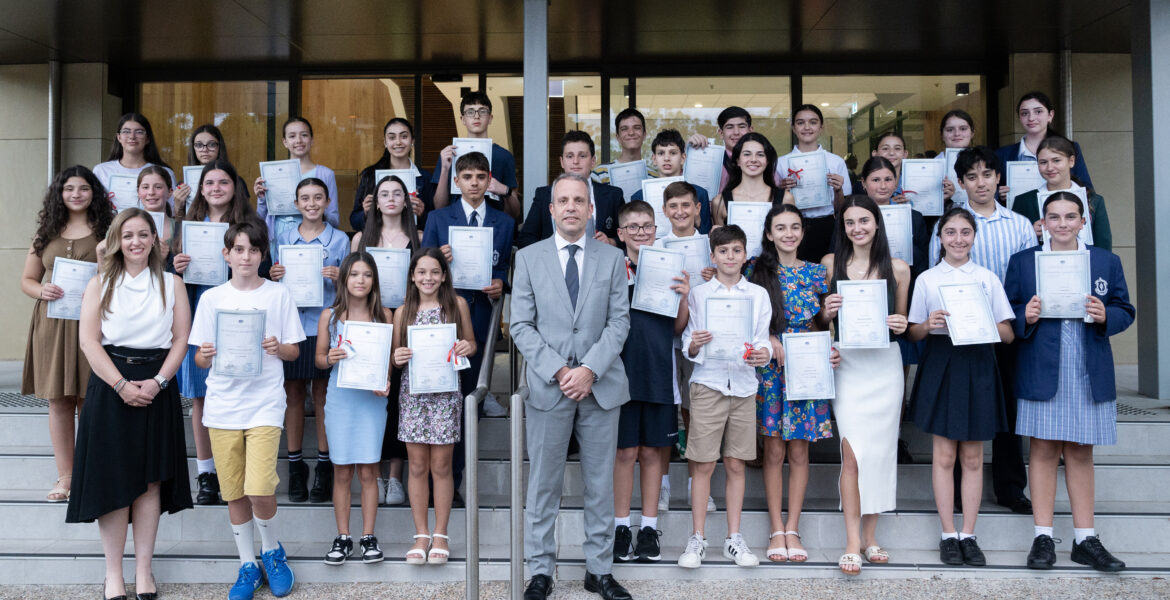On 2 February 2024, in the lead-up to the International Day of Greek Language (which is annually celebrated on February 9), Macquarie University in Sydney hosted the official award ceremony for students receiving their 2023 Certificates of Attainment in the Greek Language.
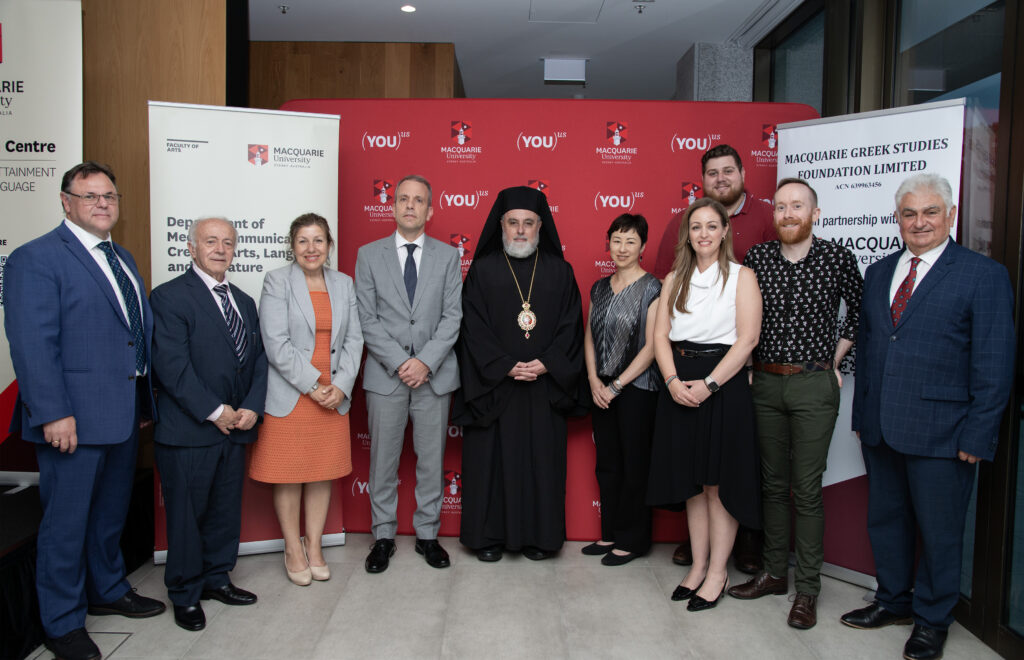
The impressive turnout at the Arts Precinct Function Centre saw more than 200 people, including successful candidates and their families, school principals, Greek language teachers, Heads of Languages in NSW schools, representatives of community organisations including the Macquarie Greek Studies Foundation, AHEPA NSW and the NSW Federation of Community Language Schools, representatives from Greek community media and various distinguished guests and local clergy led by His Grace Iakovos of Miletoupolis, representing His Eminence Archbishop Makarios of Australia, take part in this prestigious award ceremony.
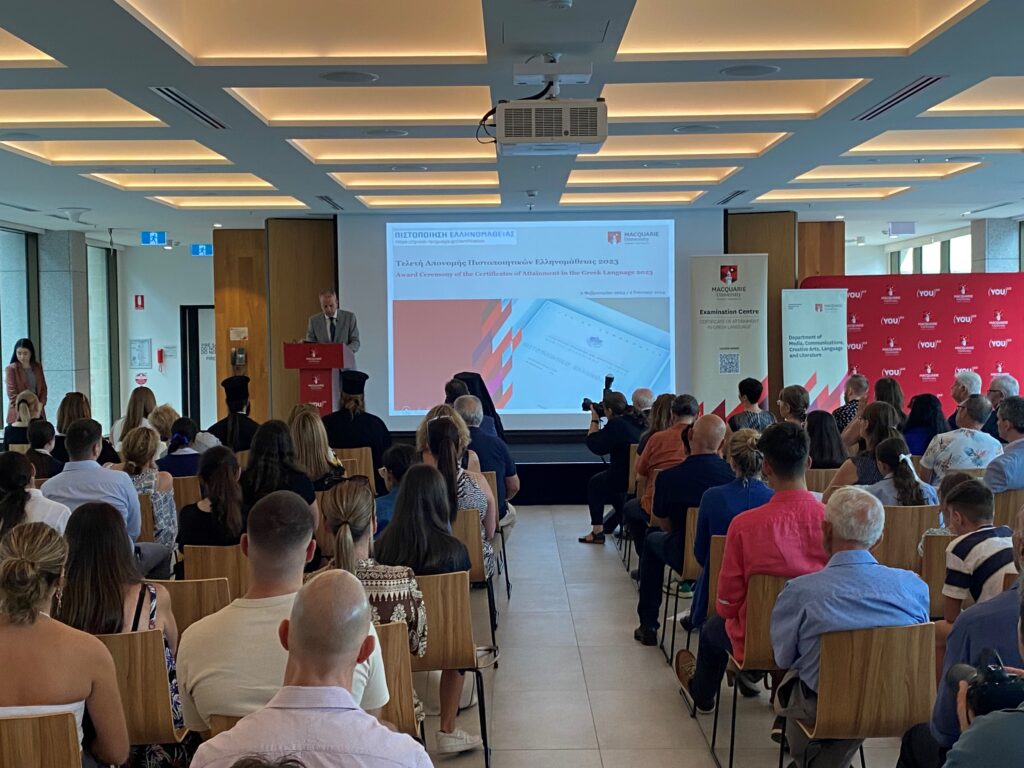
The Certificate of Attainment in the Greek Language is the only official certification of proficiency, and Macquarie University is the only certified examination centre in NSW and one of the largest in the world. It is the result of an ongoing partnership between the successful Modern Greek Studies Program at Macquarie and the Centre for Greek Language in Greece.
The Consul General of Greece in Sydney, Mr Yiannis Mallikourtis, warmly congratulated Dr Patricia Koromvokis, Lecturer in Modern Greek Studies and Head of the Examination Centre for the Greek Language Certificate, and her team for all their hard work, passionate advocacy and tireless efforts to promote the Greek language. Dr Koromvokis was the “spirit and the mind” behind the huge success of this examination centre, with the Consul General noting that in 2023 Sydney had surpassed Melbourne in terms of the numbers of students taking the Greek language proficiency exams.
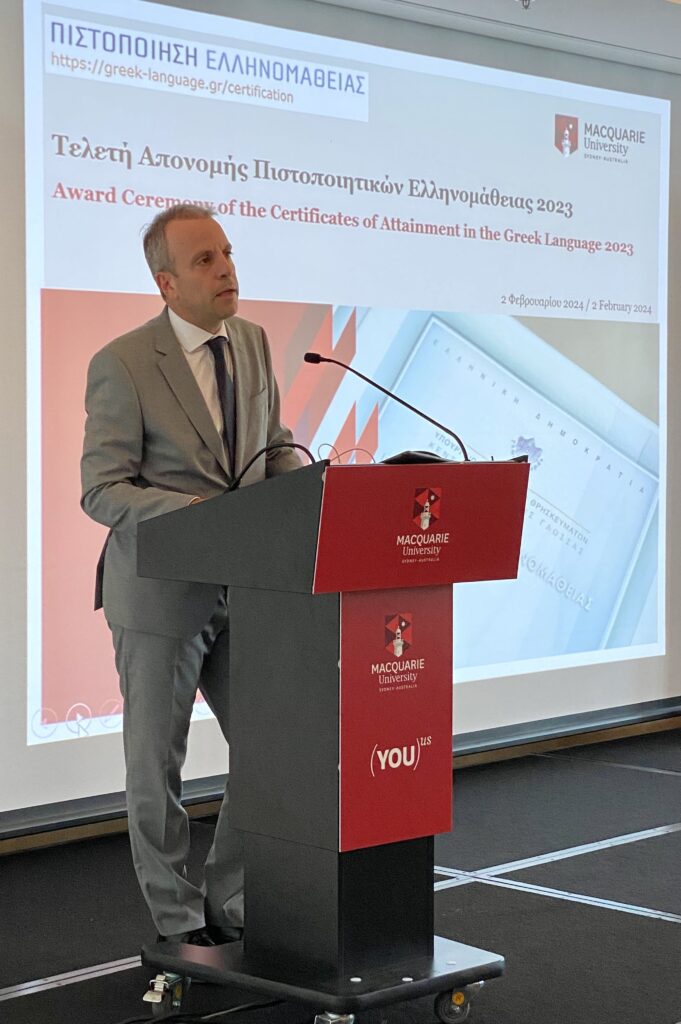
But Mr Mallikourtis reserved his greatest praise for the parents of the students “because your love of the Greek language is not a given” in the face of the real possibility that the Greek language is gradually losing its momentum (call it dynamism) compared to previous generations.
Turning to the poignant question of why we should learn Greek, the Sydney-based Greek diplomat felt that the answer, particularly in this award ceremony, is self-evident:
“Foreign languages are conducive to expanding our cognitive abilities. They also strengthen family ties, increase international opportunities and contribute to intergenerational cultural understanding. And especially in a country such as Australia which takes pride in its multicultural character multilingualism should be the norm. At the end of the day, linguistic diversity helps unity.”
Mr Mallikourtis reminded the audience that whilst Greeks in Australia can be justifiably proud of what they have achieved by the way they have integrated into Australian society so smoothly whilst remaining proud Australians of Greek origin, at the same time what is at stake is the risk of losing something which defines our identity, namely, the Greek language. He concluded:
“If we want to maintain the connection with Greece our children have to maintain some sort of understanding, not necessarily full proficiency. They at least should have a feeling of the language so that when they visit Greece they will be able to understand the psyche of the nation, what it means to be Greek. And what it means to be Greek comes through the language.”
The award ceremony also featured brief video-recorded speeches and congratulatory messages from the Greek Minister for Education, Religious Affairs, and Sports of Greece, Mr Kyriakos Pierrakakis, the General Secretary for Greeks Abroad and Public Diplomacy of the Hellenic Ministry of Foreign Affairs, Professor Ioannis Chrysoulakis, and the President of the Centre for Greek Language in Greece, Emeritus Professor of the Philology Department of the Aristotle University of Thessaloniki, Theodoros Papaggelis.
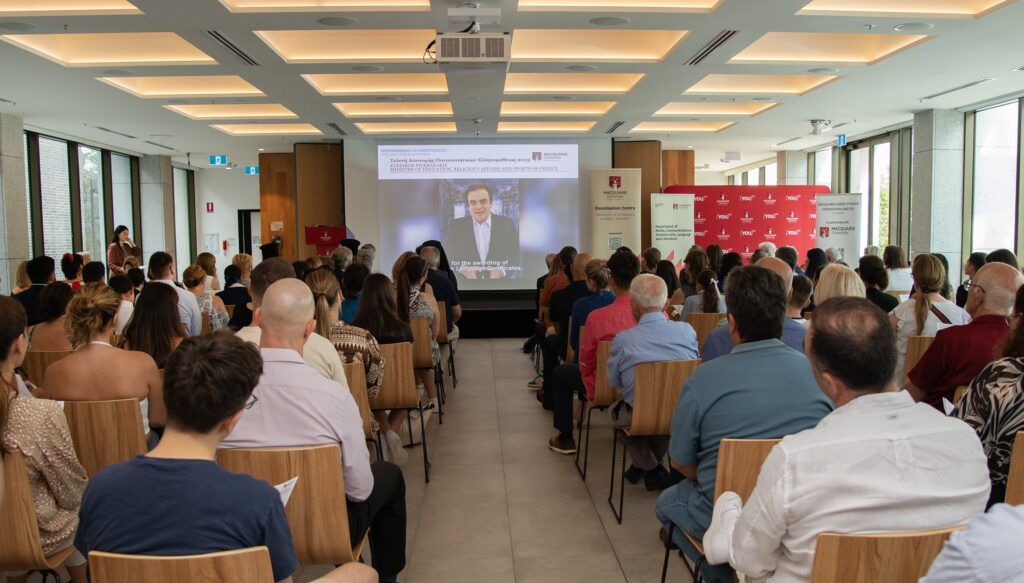
Minister Pierrakakis applauded the University’s initiative and superb contribution to the teaching of the Greek language, noting that the language has a glorious past, presence and future.
Professor Chrysoulakis reiterated that as far as Greeks in the diaspora are concerned the Greek language constitutes an integral part of their cultural identity and therefore the common objective is the preservation, cultivation and development of the Greek language, not only for Australians of Greek heritage but also Philhellenes and friends of the Greek language.
A major contributing factor in that excellent undertaking is the Macquarie University Greek language course which started approximately 40 years ago, and more recently, the establishment of the only authorised Greek language-certified examination centre in New South Wales which also happens to be the largest in Australia and one of the most significant in the whole world.
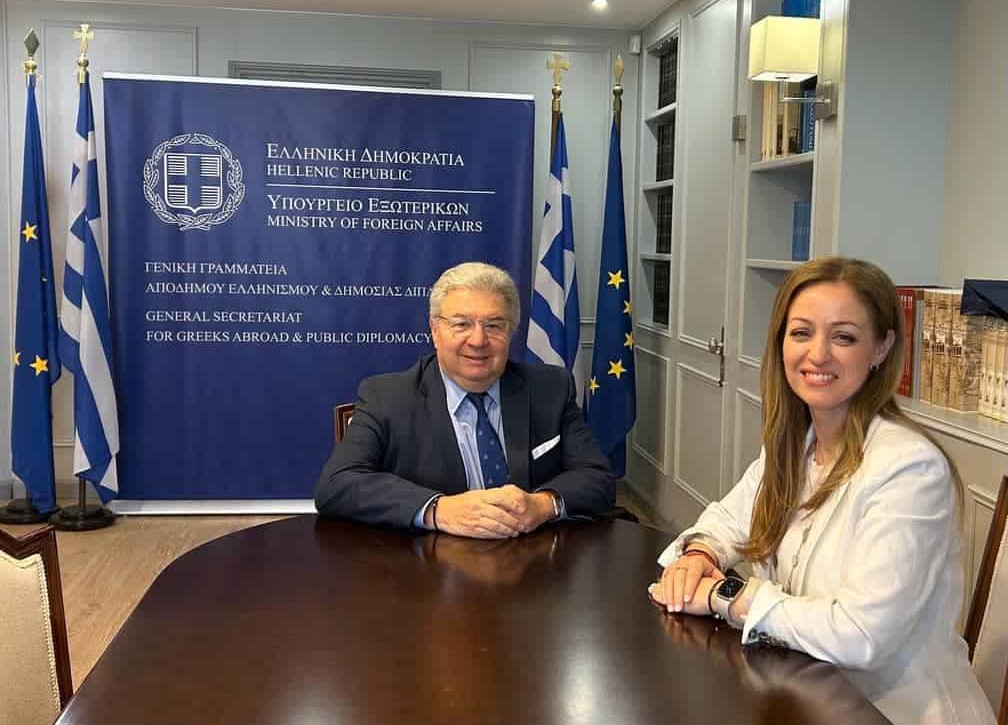
All this, noted the General Secretary, is nobly aided and facilitated by the continued support of the Macquarie University Greek Studies Foundation with the support of the Greek Government and the Greek diplomatic corps in New South Wales.
Emeritus Professor Theodoros Papaggelis in his video message extolled the historical and cultural significance of the Greek language and its unbroken history and reminded the audience that we are all the “inheritors of a rich cultural heritage which must be preserved”.
He concluded by issuing a rallying cry for the Greek language in English:
“Celebrate, fight for the best and be proud.”
Professor Hsu-Ming Teo, the Head of Macquarie University’s Department of Media, Communications, Creative Arts, Language and Literature, offered her heartfelt congratulations to the successful candidates who in her words have exhibited dedication, enthusiasm and excellence in their pursuit of Greek language proficiency.
Noting that Macquarie University is one of the largest certified Greek language examination centres in the world, the Departmental Head added:
“By embarking on the journey of learning modern Greek you have not only enriched your lives but have become ambassadors of cultural exchange. The international day of Greek language serves as a reminder that languages like Greek hold the power to connect people worldwide so be sure that the learning of the language will provide you with opportunities to pursue your interests, utilise your skills, spark your imagination, follow your pathways, connect with others and contribute to your community in whatever way you desire.”
Professor Teo also expressed her sincere gratitude to the dedicated teachers who have played a pivotal role in shaping the students’ linguistic journey as well as to the “pillars of support” – the parents, guardians and families – whose unwavering support has been an indispensable foundation for the students in the encouragement and belief in the learning of languages, particularly Greek.
Dr Wes Robertson, Chair of the Discipline of Languages and Cultures, commended the students for mastering modern Greek which, whilst being one of the more difficult languages to master, reflects the joys of learning a language and also the doors it can open and the communities it can bring together.
Dr Robertson observed that Macquarie University has a long history as a leader in language and cultural education in Australia as well as support for community languages and a vibrant multicultural Australia. Referring to the reports of potential changes to the language discipline at Macquarie, Dr Robertson passionately declared:
“I like to promise you that from all of us as individuals in languages and cultures as well as in this department we still unequivocally do language as an unparalleled source of knowledge, a powerful skill, an important aspect of Australian culture and a vital lifeblood of Australian communities.”
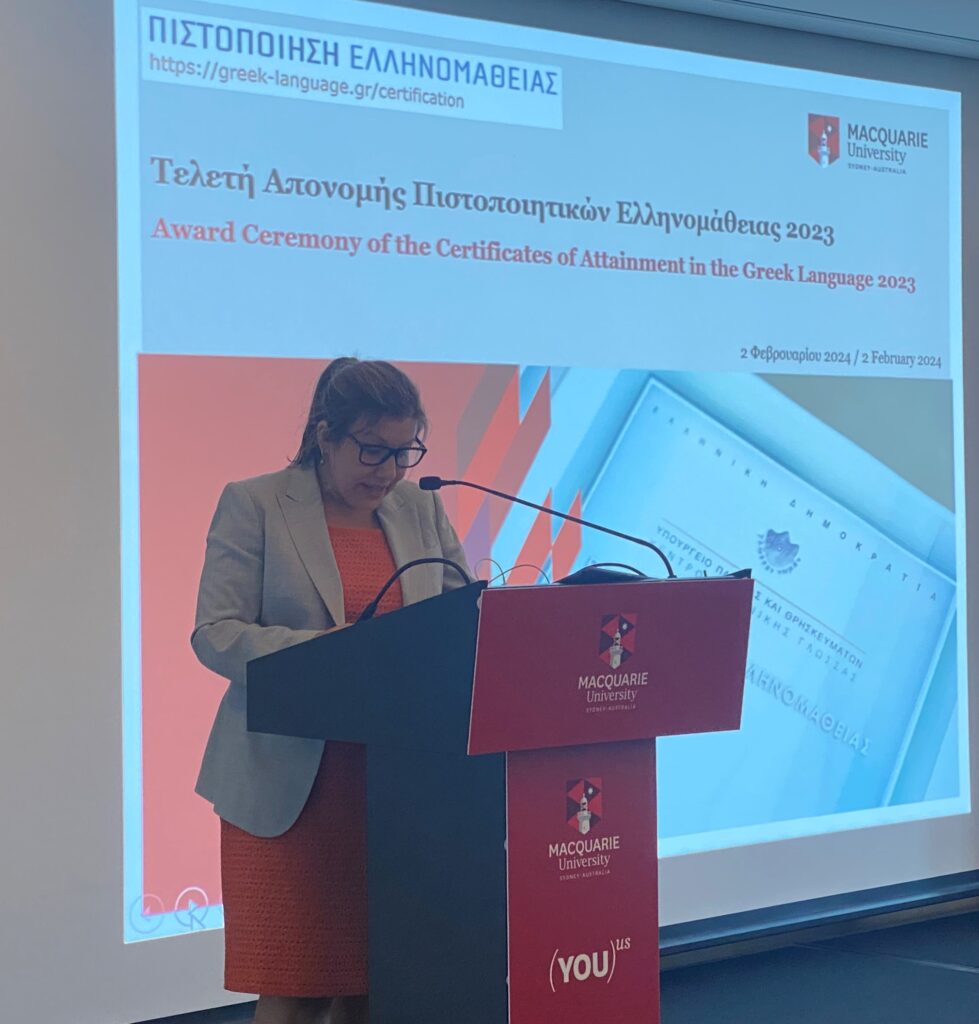
The keynote speech was delivered by the Honorable Sophie Cotsis, MP, the NSW Minister for Industrial Relations and Minister for Work Health and Safety, herself a Macquarie University alumni and the beneficiary of Modern Greek language teaching at the university.
The Minister joined the other dignitaries in praising the efforts and incredible work of Dr Patricia Koromvokis, noting that “Greek is not just a passion but a way of life for Dr Koromvokis who is someone that deeply cares for our multicultural community and keeping the Greek language”.
Sophie Cotsis also declared that learning a language other than English is of vital importance in our multicultural, multifaith and multilingual community in Australia. Learning Greek in particular continues the connection to our ancient culture and tradition and allows the traditions to be passed down through the generations as well as conferring, as with the learning of any second language, a very beneficial cognitive effect.
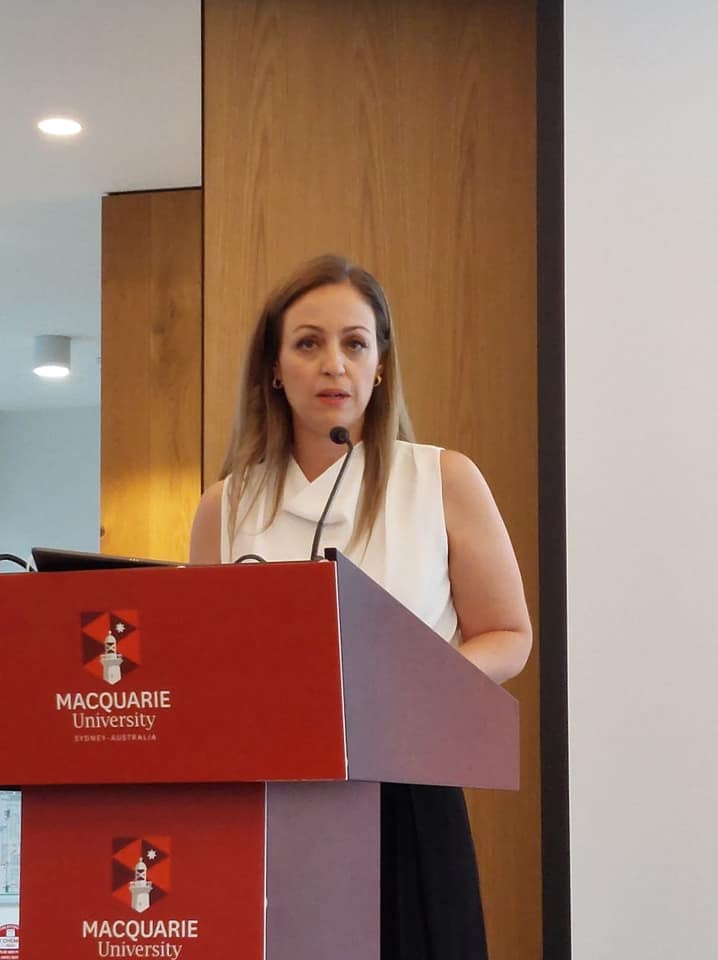
The final address was appropriately given by Dr Patricia Koromvokis, Lecturer in Modern Greek Studies at the Department of Media, Communication, Creative Arts, Languages and Cultures and Head of the Examination Centre for the Greek Language Certificate, before the formal award ceremony took place.
Dr Koromvokis warmly congratulated the successful recipients and acknowledged their achievement which made their teachers, their schools and their families proud. More specifically, Dr Koromvokis pointed out:
“Your passion for Greek language learning proves the value of our language in the diaspora, so far away from Greece. It’s because of this passion that today we celebrate the International Day of the Greek Language here in Australia.”
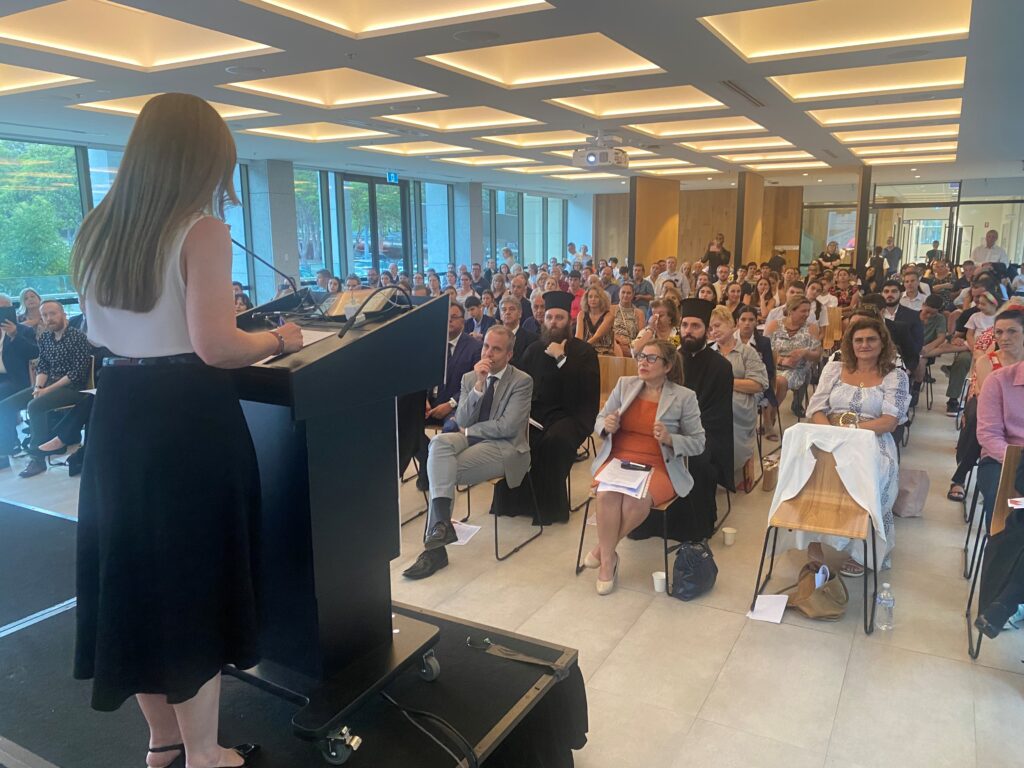
The passionate head of Greek language studies at Macquarie University proudly declared that the faculty functions as the heart of Greek studies in the whole of Australia. As for the performance of the examination centre, the results are impressive.
In 2022, 78 students participated in the exams with an 88% success rate. In the following year, 83 students participated, achieving a 94% success rate. Dr Koromvokis’ sincere hope and goal is that in 2024 there be more than 100 candidates aiming for a 100% success rate.
The successful candidates, both young students and mature adults, including two notable members of the local Greek Orthodox clergy, received their certificates of attainment to general applause and a knowing recognition by members of the audience of their sterling efforts.
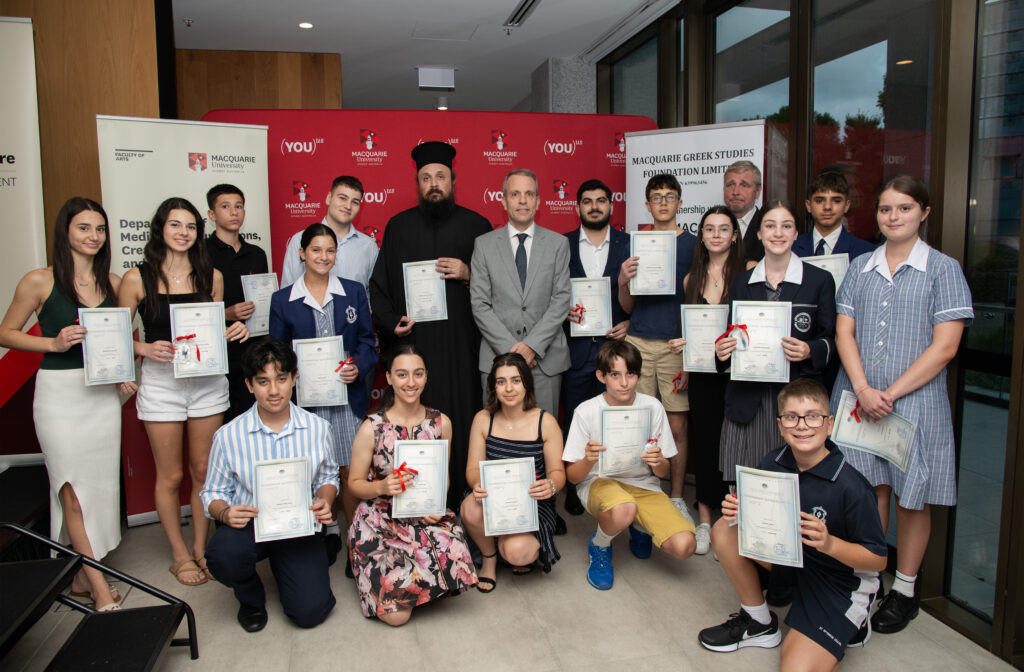
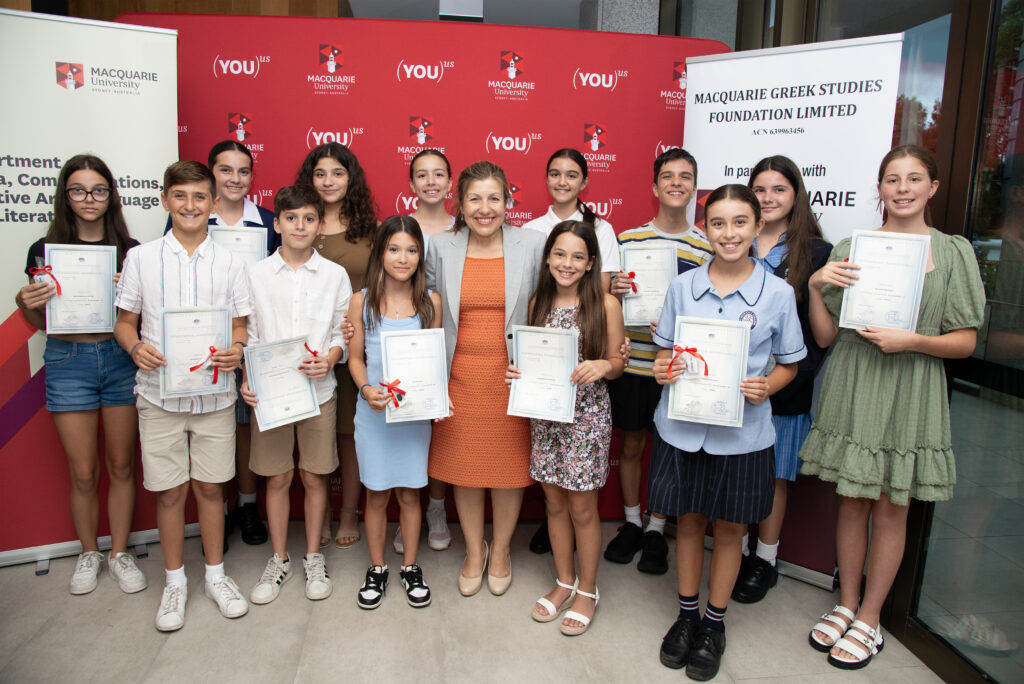
The Certificate of Attainment in the Greek Language is a globally recognised title that proves the level of proficiency of its holder in the market and is considered a prerequisite for the practice of various professions in Greece. The registrations for the Exams for the Certificate of Attainment in Greek 2024, which is conducted under the auspices of Macquarie University, are now taking place: go to this link.
Following the conferring of the certificates of achievement, the ceremony finished with the MC, Parisa Marathou, also a Macquarie alumni, reminding the audience of a statement by the well-known Greek Nobel Prize-winning poet Odysseus Elytis who once wrote in his tribute to the poet Giorgos Sarantaris:
Τι κι αν ο κόσμος είναι μάταιος;
‘Εχεις μιλήσει ελληνικά!
[“So, what if the world is futile? (At least) you have spoken Greek!”]
The Greek language will live forever.
George Vardas is the Arts and Culture Editor and was recently appointed to the Multicultural NSW Advisory Board.
Note: My formal Greek language training was courtesy of a young Greek immigrant worker, Ο κύριος Θεόδωρος, who visited our house during the late 1960s every Saturday and with my parents’ encouragement, taught my sister and me basic Greek. I am forever indebted to this teacher and my parents because Greek forever beats in my heart.

